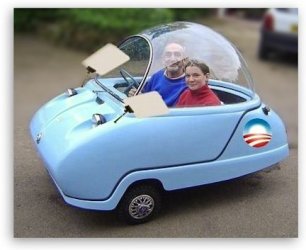ScienceRocks
Democrat all the way!
- Banned
- #1
Obama finalizes auto mileage mandate
The Hill ^ | August 28, 2012 | Ben Geman & Keith Laing
Obama finalizes auto mileage mandate - The Hill's E2-Wire
The Hill ^ | August 28, 2012 | Ben Geman & Keith Laing
Obama finalizes auto mileage mandate - The Hill's E2-Wire
The Obama administration issued final rules Tuesday that require a major boost in vehicle mileage standards, highlighting a clash with Mitt Romney as the GOP convention gets under way.


The Transportation Department and Environmental Protection Agency announced joint mileage and carbon emissions rules for model years 2017 through 2025 that will eventually force automakers to meet a standard equivalent to 54.5 miles per gallon.


Administration officials have made the rules a cornerstone of their energy agenda, noting that alongside earlier 2012-2016 rules, the mandate will eventually save consumers an estimated $1.7 trillion in fuel costs and save 12 billion barrels of oil.
“These fuel standards represent the single most important step we’ve ever taken to reduce our dependence on foreign oil,” President Obama said in a statement Tuesday, noting that by 2025 cars will get almost twice the mileage they provide today.
“It’ll strengthen our nation's energy security, it's good for middle class families and it will help create an economy built to last,” Obama said.
The rules will provide an average fuel cost savings of more than $8,000 by 2025 over the lifetime of a vehicle, according to the White House. The administration estimates the auto mileage program will cut oil U.S. consumption by more than 2 million barrels a day by 2025, which the White House emphasized as a way to further curb reliance on OPEC.
A draft of the rules late last year estimated they would cost the auto industry a total of $157 billion to make cars and light trucks that comply with the tougher standards.
The rules drew a quick rebuke from the Romney campaign, which emphasized higher upfront costs for consumers buying vehicles that meet the new requirements.
Last year, in the draft of the proposal, the administration estimated that the 2017-2025 rules would add costs that reach an average of $2,000 per new vehicle in 2025.
“Governor Romney opposes the extreme standards that President Obama has imposed, which will limit the choices available to American families. The President tells voters that his regulations will save them thousands of dollars at the pump, but always forgets to mention that the savings will be wiped out by having to pay thousands of dollars more upfront for unproven technology that they may not even want,” Romney spokeswoman Andrea Saul said in a statement.
Environmental groups cheered the standards.
“This is truly a watershed moment. Twenty years from now we’ll be looking back on this as the day we chose innovation over stagnation,” said Michelle Robinson, director of the clean vehicles program at the Union of Concerned Scientists.
But the announcement follows sharp criticism of the gas-mileage standards by some Capitol Hill Republicans, in particular House Oversight and Government Reform Committee Chairman Darrell Issa (R-Calif.).
Issa has criticized the rules’ effect on vehicle costs, and he has suggested that the Obama administration used leverage from the bailouts of U.S. auto companies in 2008 and 2009 to convince them to back the new rules.
"Increased fuel efficiency is a goal all parties support — but pursuing new standards that increase vehicle cost and decrease vehicle safety is dangerous for consumers and unacceptable from regulators," he said in a statement earlier in August.
The trade association for the U.S. auto industry, the Alliance of Automobile Manufacturers, said Tuesday that new gas-mileage standards unveiled would level the playing field for car companies that have been dealing with differing state rules.
"The Auto Alliance has called for a single, national program because conflicting requirements from several regulatory bodies raise costs, ultimately taking money out of consumers' pockets and hurting sales," the group said in a statement. "We all want to get more fuel-efficient autos on our roads, and a single, national program with a strong midterm review helps us get closer to that shared goal."
However, the auto alliance added that the market's reaction to fuel-efficient cars is still to be determined.
"After years of billion-dollar investments by automakers, consumers have a lot of choice in fuel-efficient cars and light trucks, and automakers are working to sell these high-mileage vehicles in high volumes," the group said. "Compliance with higher fuel-economy standards is based on sales, not what we put on showroom floors."
Administration officials called the rules a landmark step in efforts to battle global warming.
“Combined, the Administration’s standards will cut greenhouse gas emissions from cars and light trucks in half by 2025, reducing emissions by 6 billion metric tons over the life of the program – more than the total amount of carbon dioxide emitted by the United States in 2010,” the White House said.
The rules include incentives for electric vehicles, hybrid systems in large pick-up trucks, and other technologies.
The White House said the standards are achievable but also allow a “mid-term evaluation” that could enable the Transportation Department and EPA to make adjustments.
Officials said the standards will boost industry innovation, and argue that a range of technologies are already available, such as advanced engines and transmissions, air conditioning improvements, weight reductions, better aerodynamics and other steps.



